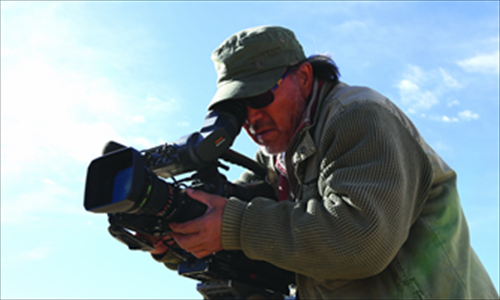
Liu Xiangchen Photos: Courtesy Liu Xiangchen
Liu Xiangchen has had his share of ups and downs.
But rough mountain terrain, fierce cold and scorching deserts, and starvation are just part of the everyday for this 60-year-old documentary maker.
For the past 20 years, Liu has recorded the lives of ethnic groups in Xinjiang Uyghur Autonomous Region, the most diverse geographic area of China.
His work often takes him through wilderness to remote villages dotting the vast Taklimakan Desert and Pamir Plateau.
His first documentary The Sun Tribe, which focuses on the Tajik ethnicity living on the Pamir Plateau, proved to be an international hit after it was broadcast on China Central Television in 1996.
And ever since Liu has kept his focus on the everyday lives of Xinjiang's people, such as the stories of Uyghur minstrels in Ashiq: the Last Troubador (2011), and most recently Eid al-Fitr (2015), the Islamic festival that ends the month-long fast of Ramadan.
Liu recently kicked off a 15-year-long project to film the cultures of peoples living at different altitudes in Xinjiang, and how they differ.
"Xinjiang is an extreme place, both in geography and differences in cultures," Liu told the Global Times.
Ups and downs
When speaking of extreme geography, for many the Tibet Autonomous Region is first to come to mind.
Known as "The Roof of the World" and home to Qomolangma, also known as Mt. Everest, there is a 7,648-meter difference in elevation between the mountain's peak (8,848 meters) and its lowest point in Metok county (115 meters).
But as Liu points out, Xinjiang takes Tibet by more than a kilometer. From Mt. Qogir, also known as K2 (8,611 meters) to the bottom of Aydingkol Lake (154 meters below sea level), Xinjiang wins by 1,117 meters.
As Xinjiang's elevations are also more varied, Liu explains the different terrains and temperatures have had a strong influence in shaping local cultures.
These differences are the basis for Liu's ongoing project.
"Xinjiang has almost the highest and lowest, is both the hottest and coldest, and has the most desolate and verdant places within its borders. And different ethnicities have a different feature based on the altitude they live, which is really rare," Liu said.
A bard's tale
Ashiq: the Last Troubador won Liu an Asian Production Award at the 11th Gold Panda TV Festival in Sichuan Province.
Liu and his crew spent 14 months following the wandering Uyghur minstrels, or ashiq, that live in the southern Taklamakan. The film also documents their searches for the musicians, which often took them to remote, desolate areas.
In Turkic cultures such as Uyghur, the Ashiq serve as bards, historians and preservers of oral traditions. They sometimes are considered shamans.
"What really touched me was the scene where all the ashiq were dancing a shaman dance together, something rarely seen [on film]," Wang Jiangjiang, an author and documentary maker on Uyghur folk music, told the Global Times. Wang is also an admirer of Liu's work.
"He went deep into the communities ... to present their real lives as accurately as possible," Wang said.
This was not an easy task. Liu endured freezing temperatures, starvation and rough terrain, all while lugging his equipment across the vast expanse of Xinjiang.
While filming Jade Mountain (2002), a documentary on jade quarry workers in Xinjiang, Liu described having to rent a donkey to carry his gas-powered electric generator up a mountain road so steep that "even goats would lose their footing."
Liu recalled with disbelief that the workers would travel the same road twice every day, while carrying dozens of kilograms of jade on their backs.
But these kind of experiences are the norm for a documentary maker, Liu said.
Northwest is best
Liu was born in Changchun, Northeast China's Jilin Province, but moved to Xinjiang at a very young age.
He first taught at a college and worked as a magazine editor before finding a job writing for Xinjiang TV in 1994.
His jobs have taken him across Xinjiang (the vast region makes up 1/6th of China's total area).
Liu believes it was these journeys that set off his desire to document Xinjiang on film.
His work includes documentaries on Tajik, Kirgiz and Uyghur ethnicities, and he has no plans to film outside Xinjiang anytime soon.
"I'm already in a place that has the best of everything, so why leave?" Liu said.



